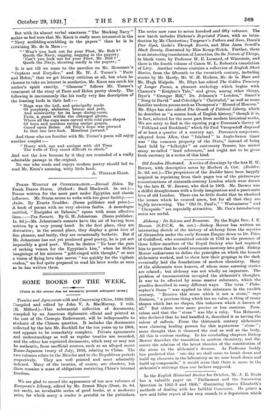We are glad to record the appearance of ten new
volumes of Everyman's Library, edited by Mr. Ernest Rhys (Dent, 2s. 6d. net each), an invaluable series of good books, at a moderate Price, for which many a reader is grateful to the publishers. The series now runs to seven hundred and fifty volumes. The new batch includes Dickens's Reprinted Pieces, with an intro- duction by Mr. Chesterton; Turgenev's Fathers and Sons, Ibsen's Peer Gynt, Gorki's Through Russia, and Miss Anna Sewell's Black Beauty, illustrated by Miss Kemp-Welch. Further, there is an interesting translation of Lucretius, On the Nature of Things, in blank verse, by Professor W. E. Leonard, of Wisconsin, and there is the fourth volume of Canon W. L. Roberts's translation of Livy. Another volume contains a collection of English Short Stories, from the fifteenth to the twentieth century, including stories by Mr. Hardy, Mr. W. H. Hudson, Mr. de in Mare and Mr. Hugh Walpole. Mr. Rhys has edited The Golden Treasury of Longer Poems, a pleasant anthology which begins with Chaucer's " Knighte's Tale," and gives, among other things, Dyer's " Grongar Hill," Dr. Johnson's " London," Smart's " Song to David " and Coleridge's " Christabel," as well as some familiar modern poems such as Thompson's " Hound of Heaven." Mr. Rhys has also edited The Growth of Political Liberty, which he describes as " a source book of English history," though it is, in fact, selected for the most part from modem historical works, We are sorry to find in the opening pays Freeman's theory of " Folkland and Bookland," which Sir Paul Vinogradoff disposed of at least a quarter of a century ago. Freeman's conjecture, adopted from Allen, that " folidand " in Anglo-Saxon times was " the common property of the State," instead of being land held by " folkright" or customary Tenure, has misled many so-called " land reformers," and ought not to be given fresh currency in a series of this kind.






































 Previous page
Previous page